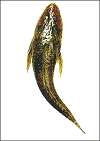Theme: Fish for the Future
Seaweek '91 coordinator: Don Alcock
|
 |
Fishy Investigations
These fishy ideas are adapted from the Resource Booklet for Schools, New Zealand Seaweek'95 by Sally Carson and Noeleen Smith.
Activity 1 - What is a fish?
 There are lots of animals living in the sea, are they all fish? There are lots of animals living in the sea, are they all fish?
- Have a brainstorm session to come up with a list of words describing fish.
- Make a list of animals that live in the sea. How many have back bones, swim with fins and breathe with gills? Which ones are fish?
Activity 2 - Fish Inside and Out
Lets investigate fish!
- Write down all the words which describe how you feel when you: touch fish; smell fish; look at fish; taste fish or catch fish.
- Find out the names of the different fish parts and their functions. If you can get a dead fish, open it up and look at the internal organs. Try to determine the name and function for each part.
Activity 3 - Sensible Sharks
 Many people believe that sharks should be removed from the ocean. Many people believe that sharks should be removed from the ocean.
- Survey your classmate's, families and community's attitudes towards sharks, dolphins, whales, eels, crabs, seaweed etc. How do they view them? Do they think they are important? Do they see them as friends or enemies? Are they good to eat? Graph your results.
- Are sharks fish? How are sharks different from other fish?
- What types of sharks are found around your area, where do they live, what do they eat and how far do they travel?
- Are shark populations threatened? Why? Are sharks an important part of the ocean food webs and ecosystems?
Activity 4 - Fish Rights
Humans have rights. Do fish have rights? What are the needs of fish? Are they able to live a long, safe and healthy life? Does it matter?
- Divide the class into two groups, one supports 'Fish have rights and must be helped' the other group says 'Fish don't matter'. Make a list of points and issues which your group can use to support their idea.
- Choose three speakers each and have a debate.
- Decorate the debating stage with posters and displays to reinforce your points and issues.
|
|
Activity 5 - Fish for Sale
 Visit a fish seller and investigate the fish for sale. Visit a fish seller and investigate the fish for sale.
- Where does the fish in the shop come from? The ocean or a farm? Which part of the ocean, inshore, deep sea, continental shelf or other?
- How was it caught? What type of boats, lines, nets etc. What time of day? What regulations?
- Is all the fish fresh? Are some fish seasonal? How did it get transported to the shop? How is the fish kept in the shop?
- What are the names of the fish for sale? Are they descriptive names? Do some fish have more than one name? Why?
- What is done with unsold fish?
- Which fish is the most expensive/cheapest? Why is there a difference in price? Compare the price of fish with the price of meat, eggs, etc.
- People say 'fish is good for you', find out the nutritive value of fish and compare that with the value of other foods.
Activity 6 - Fish Farming
Can you be a fish farmer, what type of information would you need to know?
- What is fish farming called?
- What type of marine species are farmed in the Australian waters. What water conditions are necessary for successful farms (temperature, degree of exposure, currents, tidal range etc)?
- What type and size of cages (pens) are used to hold the animals? How many per cage?
- Do you need a licence to set up a farm?
- Are the fish fed? What and where does the fish food come from?
- What are the harvest methods, how are they sold and what is the revenue per fish?
- Some people have concerns about fish farming, what are these?
- Choose a marine species that you would like to farm. Try to design your own fish farm.
|
|